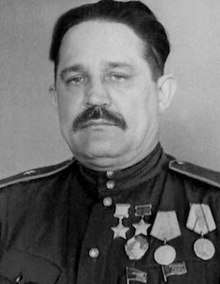Oleksiy Fedorov
Oleksiy Fedorovych Fedorov (Ukrainian: Олексій Федорович Федоров, Russian: Алексей Фёдорович Фёдоров, Aleksey Fyodorovich Fyodorov; 30 March 1901 - 9 September 1989), was one of the leaders of Soviet partisan movement during World War II. He was twice awarded the title Hero of the Soviet Union, making him one of the only two partisan leaders to receive the title twice (the other being fellow Ukrainian Sydir Kovpak).
Oleksiy Fedorov | |
|---|---|
 | |
| Born | 30 March 1901 Russian Empire |
| Died | 9 September 1989 (aged 88) Kiev |
| Allegiance | |
| Years of service | 1941 - 1944 |
| Rank | Major General |
| Battles/wars | Hero of the Soviet Union (twice) |
Biography
Oleksiy Fedorov was born near Dnipropetrovsk in a Ukrainian[1] peasant family. In 1920 he joined the Red Army and fought in the Russian Civil War.
In 1927 he joined Communist Party of the Soviet Union and by 1938 became a first secretary of the regional party committee in Chernihiv Oblast.
After the Nazi Germany invasion of the Soviet Union, Fedorov became a prominent organizer of the underground resistance in occupied Ukraine. During the winter of 1941-1942 he commanded Chernigov partisan unit which by March 1942 had sixteen engagements with the enemy and killed over a thousand German troops. In May 1942 Oleksiy Fedorov was awarded a title Hero of the Soviet Union and the Order of Lenin with a golden star. During the spring and summer of 1943 Fedorov's partisan units expanded guerrilla activities into other occupied regions of USSR outside north-east Ukraine including the Volyn, Belarus, Bryansk and Oryol regions. During the legendary Kovel railway hub operation in the autumn of 1943 and the following winter, the partisans of Fedorov liquidated over 500 German supply trains full of ammunition, fuel, military equipment and army personnel.[2]
Oleksiy Fedorov was promoted to the rank of major general and in January 1944 awarded a second Gold Star medal.
Civilian life
After the liberation of Ukraine, Oleksiy Fedorov headed Communist party committees in several Ukrainian regions including Kherson (1944–1949) Izmail (1950–1952) and Zhytomyr (1952–1957) oblasts. In 1957 he became a Minister of Welfare in the government of Ukrainian SSR and until 1979 he served as a deputy of the Supreme Soviet of the USSR.
Oleksiy Fedorov died on September 9, 1989 in Kiev, a monument was built to honour partisan hero of anti-Nazi struggle in his native Dnipropetrovsk.
Awards
Oleksiy Fedorov was awarded:
- Twice Hero of the Soviet Union (1942 and 1944)
- Six Orders of Lenin (1939, 1942, 1961, 1981)
- Order of Suvorov 1st class (1945)
- Order of Bogdan Khmelnitsky 1st class (1944)
- Order of the Red Banner
- Order of the Patriotic War 1st class (1945)
- Order of the Patriotic War 2nd class (1945)
- Order of the Red Star
- Order of the October Revolution
- Order of the Red Banner of Labour
- Medal "Partisan of the Patriotic War" 1st class
- Medal "For the Victory over Germany in the Great Patriotic War 1941–1945"
References
- ф.П-470, облікова картка
- "Фёдоров Алексей Фёдорович". www.warheroes.ru. Retrieved 2019-05-08.
External links
- Fyodorov in wartime, photo by Yakov Davidson, Photo Archive, Ghetto Fighters' House
- War Hero Aleksey Fyodorov - in Russian.